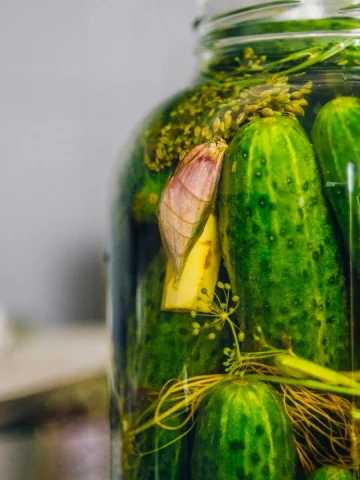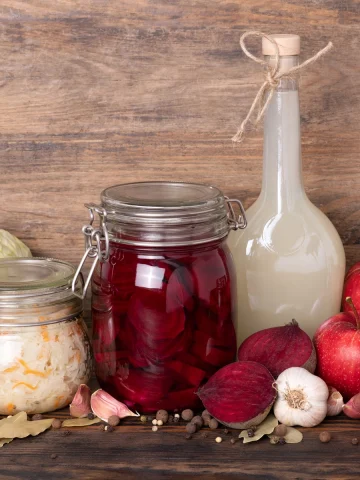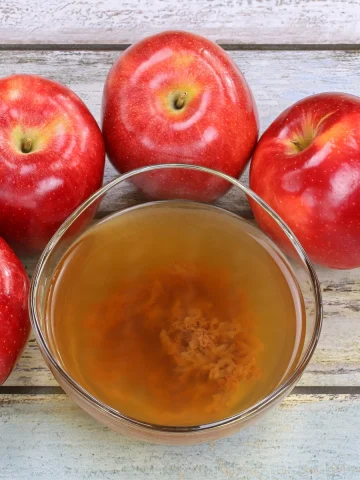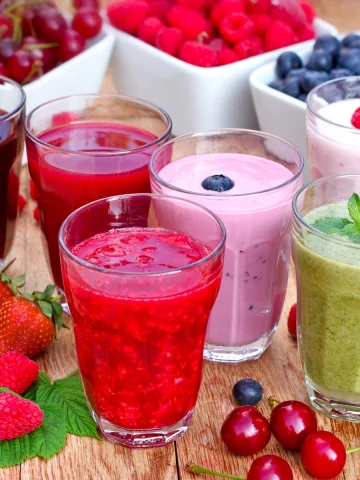Fermented foods are a fantastic way to promote a healthy gut, as they contain beneficial bacteria that can improve digestion and reduce inflammation. But the best part of this all-natural approach to fixing an unhealthy gut? These foods are absolutely delicious and easy to prepare at home.
In this article, we will explore the benefits of fermented foods for gut health and some of your best options. We’ll also advise you on how to incorporate them into your diet. Let's get started!
What Are the Benefits of Fermented Foods for Gut Health?

When you allow foods to ferment, they develop a whole host of beneficial bacteria called probiotics. These can help improve gut issues and overall health in several ways. Let’s take a look at some of the top benefits below.
Improves Digestion
One of the top benefits of fermentation is that it helps break down some of the natural sugars and starches present in different types of food. This can make fermented foods much easier on the digestive system, benefiting those with certain intolerances.
For example, take those suffering from a food intolerance, such as lactose intolerance. Lactose, a natural sugar in milk, gets broken down into glucose and galactose during fermentation.
These simpler sugars are much easier on the digestive system and can make products like yogurt and cheese much more accessible - not to mention enjoyable! - to the lactose intolerant.
Increases the Availability of Nutrients
Fermenting foods also makes certain nutrients available to our bodies, including our gut. Some compounds inhibit the absorption of certain vitamins and minerals, and fermenting foods help us remove these ‘anti-nutrient’ compounds.
For example, let’s take phytic acid, found in legumes like soybeans. While soybeans are generally considered healthy foods, their phytic acid creates a problem: it can inhibit our absorption of zinc and iron.
And since both of these are needed by the beneficial bacteria in the gut microbiota, a lack of these may cause digestive issues. Zinc alone plays an essential role in producing digestive enzymes and healing the digestive lining, so it’s certainly not a nutrient you want to miss out on for gut health.
Fortunately, fermenting these phytic acid-containing foods can make a real difference here. By allowing soybeans to ferment, we can help remove the phytic acid, allowing our bodies easier access to gut-boosting nutrients like zinc and iron.
Reduces Inflammation
If you have GI conditions like celiac disease or inflammatory bowel disease, you may find relief by eating fermented foods. As it turns out, fermented foods can even lower inflammation in the body and improve poor gut health.
In one study, 36 healthy adults were split into two groups. One group ate a diet focused on fermented foods, while the other ate high-fiber foods.
By the end of the study, there was a significant difference between the groups: the fermented food group showed more diversity in their gut microbes and decreased inflammatory proteins.
This indicates that fermented foods can reduce inflammation by acting on the gut microbiome. And this may not only benefit those with inflammatory GI conditions - it may also improve symptoms of those with non-GI conditions like arthritis.
What Are the Best Fermented Foods for Gut Health?
As you can see, fermented foods can do wonders for the gut. But now you may wonder: is this true of all fermented foods? Or are some better for your gut than others?
While there are benefits to be had from all kinds of fermented foods, some may be especially good for gut health. Take a look at some of the best ones below.
Probiotic Yogurt
There’s a good chance that you’re familiar with this one. Probiotic yogurt is made by fermenting milk with those live bacterial cultures that are so good for your digestive tracts, like Lactobacillus bulgaricus and Streptococcus thermophilus.
This makes it an excellent source of probiotics, which can help you maintain a healthy gut microbiome.
Now, it’s important to note that not all yogurts are created equal regarding gut health. We are specifically referring to probiotic yogurt here because these beneficial bacteria are often killed when processing other types of yogurt.
Kefir
Are you interested in another type of fermented milk full of healthy gut bacteria? Then try kefir, made by adding kefir grains (a combination of bacteria and yeast) to - you guessed it - milk. This gives you a thick drink that tastes like yogurt.
Despite their similarities, kefir and yogurt are not the same - in fact, they may be even better for gut health.
Containing up to 61 strains of yeasts and bacteria, kefir grains can be a powerful and diverse source of probiotics that can do wonders for restoring the balance of bacteria in your gut.
Most other fermented dairy products don’t contain any helpful yeasts, let alone such a range of bacterial strains.
Related Recipe: Kefir Smoothie
Kimchi
If you want to avoid fermented dairy products, fermented food like kimchi may be for you. Kimchi is a popular Korean side dish made from fermenting vegetables with various spices and seasonings.
Cabbage is typically the vegetable of choice, but you may also see radishes and others there. And as for the spices, you can find everything from ginger to garlic to pepper to even spicier options in a bowl of kimchi, so there is a flavor out there for everyone.
Since it is rich in probiotics, kimchi can be an excellent choice for those looking for a veggie-friendly way to improve their gut health. Who couldn’t use a few more vegetables in their diet, anyway?
Related Recipes: Spicy Kimchi, Sweet Kimchi with Daikon Radish
Tempeh
While kimchi may sound like a good fit for vegans, this isn’t usually true. It’s often made using fish sauce, paste, or other seafood, making it unsuitable for this diet.
So, if you need a vegan-friendly way to heal gut health, you may want to try something like tempeh instead.
Tempeh is a high-protein meat alternative made from fermented soybeans with a firm, chewy texture. One of the reasons why it’s so popular - besides its impressive probiotic content, of course - is that it’s versatile.
You can easily bake, steam, or saute tempeh before adding it to your favorite dishes. It’s even good in a sandwich if you want to take its gut-healing properties on the go.
Related: What are those black spots on tempeh?
How to Incorporate Fermented Foods Into Your Diet
While you may want to start incorporating fermented foods into your diet for their gut health-boosting properties, this is often easier said than done - especially if you’ve never tried them.
So, if you want to make the process as smooth and successful as possible, read on for some of our top tips.
Start Small
While you may not have a hard time diving into fermented foods like probiotic yogurt, it can help to start small with some of the others.
For example, if you’d like to drink your daily dose of beneficial gut bacteria, try some of the best kefir to buy for gut health.
Or, you could always try mixing it with some familiar flavors by working it into your favorite meals. Tempeh, for example, can be an excellent substitute for pork, chicken, and even beef.
Experiment with Different Types
They may undergo a similar fermentation process, but these foods come in various tastes and textures, so they’re certainly not the same. For example, that almost sour, tangy yogurt taste is a far cry from tempeh's strong, nutty flavor.
So, if you don’t like one fermented food, don’t count them all out - try another! With some experimentation and patience, you’re bound to find one you enjoy.
Make Your Own
One of the best things about fermented foods is that you can easily make them yourself. This is especially great when you’re first trying to incorporate them into your diet, as it allows you to control the ingredients and customize the dishes to your liking.
You need a good recipe (perhaps for kimchi or kefir), patience, and the right equipment. And besides, some foods are much better when you make them yourself.
The Bottom Line
Healing gut health with fermented foods doesn’t have to be complicated. By incorporating probiotic-rich foods like probiotic yogurt, kefir, kimchi, and tempeh into your diet, you can help heal your gut by improving digestion, increasing the availability of nutrients, and reducing inflammation.
And when you start small, experiment with different types, and make your own at home, enjoying the good bacteria in fermented foods can be much easier.
So what are you waiting for? Start taking control of your gut health today!




